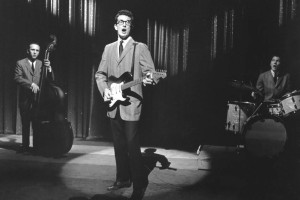WSJ Historically Speaking: American Pie’ and the History of Mysterious Rock Lyrics
Earlier this month, one of the greatest mysteries in rock ’n’ roll was finally solved. The unnamed “king” and “jester on the sidelines” in Don McLean’s iconic 1971 song “American Pie” were revealed to be Elvis Presley and Bob Dylan, respectively.
The lyrics of “American Pie” are about “the day the music died”: Feb. 3, 1959, when Buddy Holly, Ritchie Valens and J.P. Richardson (aka “The Big Bopper”) went down in a plane crash in Iowa. Critics have long wanted to know whether the song referred only to the obvious tragedy for music or was also a general cry for a lost era of American innocence.
Mr. McLean himself says that trying to pin down the exact meaning of “American Pie” runs contrary to the song’s spirit. Understanding the lyrics “was not a parlor game,” Mr. McLean wrote in the auction catalog accompanying the recent sale of his original working manuscript at Christies. Nevertheless, he declared that the song was indeed a lament—“an indescribable photograph of America that I tried to capture in words and music.”
The history of “American Pie” highlights a fundamental conundrum in rock music: The intended meaning of lyrics has often turned out to be at odds with the ways they are received.
One of the most famous examples is Bruce Springsteen’s 1984 “Born in the U.S.A.” Written as a protest against militarism, exploitation and the suffering of many Vietnam War veterans, the song’s angry themes were initially drowned out by its catchy chorus and upbeat tempo on electric guitar. Among those who either misheard or misunderstood the lyrics were members of President Ronald Reagan’s 1984 re-election campaign. For a brief moment, “Born in the U.S.A.” became the GOP’s unofficial campaign song, much to the bemusement of rock aficionados. Exasperated, Mr. Springsteen ultimately decided to perform the song with an acoustic guitar so that the lyrics could be more easily heard and understood.
Sometimes, the clues to a song’s true meaning have been obvious only to those who claim to be in the know. Some fans insisted that Little Richard’s innocent-sounding “Tutti Frutti” wasn’t about ice cream but about a certain sex act. Others claimed that the virgin in Madonna’s “Like a Virgin” was actually a man.
Then there are the songs from the 1960s and ’70s that everyone assumes are about drugs—but aren’t. Topping the list is the Beatles’ trippy “Lucy in the Sky with Diamonds,” which is widely seen as a paean to LSD. But John Lennon insisted that the lyrics were simply about a picture that his son Julian painted at school. The late Lou Reed similarly fought a losing battle with people who claimed that his love ballad “Perfect Day” was a celebration of heroin. As for “Puff the Magic Dragon” by Peter, Paul and Mary, the songwriters were outraged that some thought the boy “Jackie Paper” was a reference to reefer paper for smoking marijuana.
Dwarfing these disagreements, however, were the claims by conspiracy theorists that songs such as Queen’s “Another One Bites the Dust” and Led Zeppelin’s “Stairway to Heaven” revealed secret messages when played backward. The controversy encouraged some artists to put such messages in as a deliberate joke. But the fad petered out in the 1990s after the heavy-metal band Judas Priest faced a lawsuit from two families who argued that their sons were driven to commit suicide by subliminal messages in “Better by You, Better than Me.”
The meaning of “American Pie” is now revealed, but that still leaves rock ’n’ roll’s other great mystery. Who was Carly Simon singing about in “You’re So Vain”?

